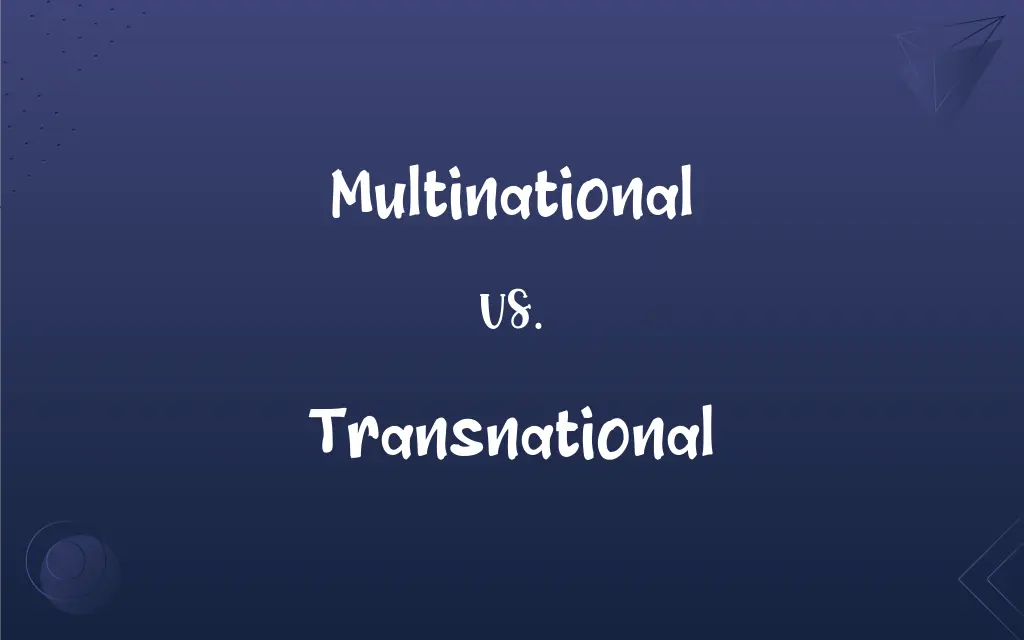Multinational vs. Transnational: What's the Difference?
Edited by Harlon Moss || By Janet White || Published on November 22, 2023
Multinational companies operate in multiple countries but have centralized management, whereas transnational companies have integrated global operations and decentralized management.

Key Differences
Multinational companies have their presence in multiple countries but are managed from a head office in the home country. This head office oversees global policies, strategies, and operations. Transnational companies, on the other hand, are decentralized and operate in a coordinated manner across various countries, adapting their strategies and structures to each specific region.
Multinational corporations focus on adapting their products and services to each specific market, emphasizing the importance of local responsiveness. Conversely, transnational corporations focus on optimizing and integrating resources, processes, and output across their global network to achieve efficiency, innovation, and local responsiveness.
The structure of a multinational organization often emphasizes the autonomy of its regional or national subsidiaries, enabling them to operate independently in their respective markets. In contrast, a transnational organization seeks to balance the need for efficiency and coherence with the need for flexibility and adaptation, emphasizing integrated and interconnected operations.
In a multinational approach, the subsidiaries act as distinct entities with their strategies and operational procedures, often resulting in variations in products and services. Transnational corporations strive for a cohesive global strategy, emphasizing shared values, goals, and operational coherence, leveraging the interconnectedness of their various units.
Multinational enterprises might face challenges related to managing diverse and independent subsidiaries and aligning them with the overall corporate strategy. Transnational enterprises might grapple with the complexities of integrating processes, managing interdependencies, and maintaining a balance between global integration and local responsiveness.
ADVERTISEMENT
Comparison Chart
Management Structure
Centralized management from the home country.
Decentralized and coordinated management across countries.
Operational Approach
Emphasizes local responsiveness and adaptation.
Focuses on global integration and local responsiveness.
Subsidiaries
Operate relatively independently in each country.
Are interconnected and interdependent across countries.
Strategic Focus
Adaptation of products and services to local markets.
Optimization and innovation in processes across borders.
Challenges
Managing diverse and independent subsidiaries.
Balancing global integration with local adaptation.
ADVERTISEMENT
Multinational and Transnational Definitions
Multinational
Relating to or operating in several countries.
The multinational company has offices in 20 countries.
Transnational
Focused on global integration and efficiency.
The transnational corporation optimized its processes to enhance global productivity.
Multinational
Featuring autonomous or semi-autonomous subsidiaries.
The multinational enterprise's subsidiaries operate independently in their respective markets.
Transnational
Having decentralized management with coordinated global operations.
The transnational company manages its operations collaboratively across borders.
Multinational
Having centralized management and operations led from a head office.
The multinational corporation's head office is located in New York.
Transnational
Extending or operating across national boundaries.
The transnational organization has a significant presence in Europe and Asia.
Multinational
Adapting products and services to local markets.
The multinational brand offers different product variants in different countries.
Transnational
Balancing local adaptation with global coherence.
The transnational entity maintains a balance between local market needs and global standards.
Multinational
Focused on local responsiveness and market-specific strategies.
The multinational firm developed a new strategy to cater to the Asian market.
Transnational
Emphasizing interconnected and interdependent subsidiaries.
The transnational firm's subsidiaries work together to achieve common goals.
Multinational
Having operations, subsidiaries, or investments in more than two countries
A multinational corporation.
Transnational
Reaching beyond or transcending national boundaries
"the transnational ramifications of terror networks" (Emanuel Litvinoff).
Multinational
Of or involving more than two countries
A multinational research project.
Transnational
Relating to or involving several nations or nationalities
Transnational organizations.
Multinational
A company or corporation operating in more than two countries.
Transnational
Between or beyond national boundaries.
Multinational
Of, or involving more than two nations (externally between countries or internally in a country).
Transnational
Involving several nations or nationalities.
Multinational
(of a business organization) Operating, or having subsidiary companies in multiple countries (especially more than two).
Transnational
Someone operating in several countries.
Multinational
A multinational company.
Transnational
Involving or operating in several nations or nationalities;
Multinational corporations
Transnational terrorist networks
Multinational
Involving or operating in several nations or nationalities;
Multinational corporations
Transnational terrorist networks
FAQs
Is a Multinational company centrally managed?
Yes, multinational companies usually have centralized management.
Do Transnational companies operate across national boundaries?
Yes, transnational companies operate across multiple countries.
Do Multinational companies adapt to local markets?
Yes, they typically adapt their products and services to local market needs.
Is the management of Transnational companies decentralized?
Yes, transnational companies have a decentralized and coordinated management structure.
Do Multinational companies face alignment challenges?
Yes, aligning diverse subsidiaries with overall corporate strategy can be challenging.
Are Transnational companies focused on innovation?
Yes, they often emphasize innovation in processes and operations.
Do Multinational companies have autonomous subsidiaries?
Yes, their subsidiaries often operate relatively independently.
Are Multinational companies present in multiple countries?
Yes, they operate in several countries with a presence in various markets.
Do Transnational companies optimize their processes globally?
Yes, they focus on optimizing and innovating processes across borders.
Do Transnational companies maintain global standards?
Yes, they strive to maintain a balance between global standards and local adaptation.
Do Transnational companies have interconnected subsidiaries?
Yes, their subsidiaries are typically interconnected and interdependent.
Do Transnational companies focus on global integration?
Yes, they emphasize global integration and local responsiveness.
Is the operational approach of Multinational companies market-specific?
Yes, they focus on adapting to the specific needs of each market they operate in.
Can Multinational companies have semi-autonomous subsidiaries?
Yes, their subsidiaries can be autonomous or semi-autonomous, focusing on local market needs.
Are the strategies of Multinational companies diverse?
Yes, they often have diverse strategies to cater to different local markets.
About Author
Written by
Janet WhiteJanet White has been an esteemed writer and blogger for Difference Wiki. Holding a Master's degree in Science and Medical Journalism from the prestigious Boston University, she has consistently demonstrated her expertise and passion for her field. When she's not immersed in her work, Janet relishes her time exercising, delving into a good book, and cherishing moments with friends and family.
Edited by
Harlon MossHarlon is a seasoned quality moderator and accomplished content writer for Difference Wiki. An alumnus of the prestigious University of California, he earned his degree in Computer Science. Leveraging his academic background, Harlon brings a meticulous and informed perspective to his work, ensuring content accuracy and excellence.































































